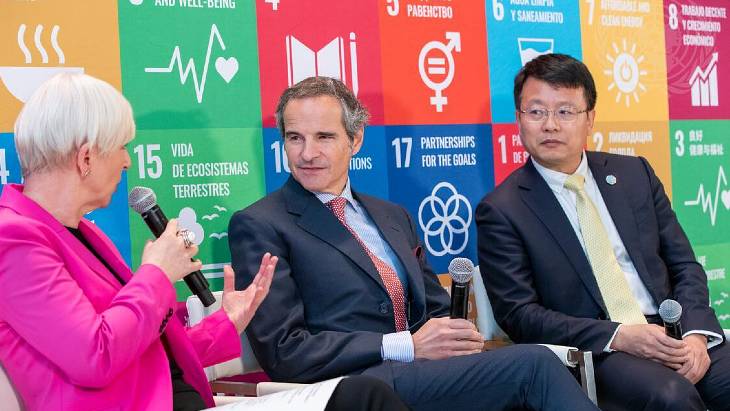The International Atomic Energy Agency (IAEA) has launched the Global Water Analysis Laboratory Network to help countries generate their own chemical, biological and isotopic water data and develop tailored water management strategies.

The IAEA's Grossi, centre, and the FAO's Lifeng Li, right, discussed water action at the UN 2023 Water Conference (Image: UN Photo/Paulo Figueiras)
The Global Water Analysis Laboratory Network (GloWAL) is intended to enable independent data generation in developing countries and reduce technical gaps with developed countries, strengthen water management through training fellowships and exchanges of staff and make water resource management "more sustainable and consequential".
The network will encourage partnerships in regional sub-networks in Africa, Latin America, the Caribbean, Asia and the Pacific and Central Asia. It was launched at the UN 2023 Water Conference, and is targeting the United Nations Sustainable Development Goal 6 (SDG 6), on Clean Water and Sanitation. The IAEA said that "laboratories that can generate reliable data in a timely manner are the cornerstone of any country's capacity to better understand and manage their water resources".
The IAEA said isotope hydrology "works on the basis of the composite of water molecules and their isotopic properties, and the combination of these water molecules, which give a water sample a unique ‘fingerprint’ ... analysts can measure isotope ratios to track the flow of water and its travel time. Stable isotopic tracers can be used to determine water quality, while unstable (radioactive) tracers can be used to track water movement".
An example of where the network could help, given by IAEA director general Rafael Mariano Grossi, was that of Tajikistan, which would host a GloWAL laboratory that would be able to monitor the state of glaciers which provide much of the region's freshwater: "Glacier degradation is a very serious problem and by doing this we are giving them the ability to see how fast the glaciers and snowcaps can be regenerated and how to perhaps better manage the run-off water, because, of course, if it is melting, there will be less of it."
Construction work is currently under way on the IAEA Isotope Hydrology Laboratory in Vienna, Austria, which will provide more capacity support for the network and help member states develop more efficient analytical methods.
The launch event also included officials and experts from El Salvador, Germany, Moldova, Namibia, Pakistan, Paraguay, Saint Kitts and Nevis, Switzerland, Tajikistan and the USA, plus other UN bodies, the World Bank Group, IHE Delft Institute for Water Education and the International Groundwater Resources Assessment Centre.
The impact of climate change means some areas are becoming wetter - and some drier - and pollutants and contaminants can also add to the pressures on water supplies. The IAEA says: "With water data, policymakers can make informed decisions on siting agricultural activities and urban planning, based on sustainability and quality of bulk water supply."
Grossi said that in addition to "promises and descriptions of how dire and severe the situation is, it is important that we take concrete steps together, in order to start redressing the situation and put SDG 6 back on track".
Petteri Taalas, Secretary-General from the partnering World Meteorological Organization, said: "We have to improve our understanding of the hydrological cycle. Our recommendation is that countries establish weather stations at the shared locations in the GloWAL network, for a better picture of what is happening through hydrological measurements."
Lifeng Li, director, land and water division at the UN's Food and Agriculture Organization (FAO), said it "believes that agriculture can contribute to a more water- and food-secure world in the future" citing the example of larger countries like China and the USA where more efficient and sustainable water and land management practices have led to increased yields from less water, as well as initiatives for reusing and recycling water.
The IAEA said "sustainable financing is a key accelerator" for GloWAL so "welcomes support and collaboration from international financial institutions, governments, the private sector as well as public-private partnerships".